The Emergence of ABCD in Australia and the Asia Pacific
Written by: ABCD Asia Pacific co-founders and members
This is the story that involves many people, over many years, and it tells us of their work and the emergence of the language and the principles of Asset-based Community Development (ABCD) in Australia and some of its’ Asian neighbours. The compilation of this story is a collective effort and we have reflected on the adaption and adoption of the ABCD approach in the communities in which we live and work.
Since the 1970s, Peter Kenyon, Bank of IDEAS, Australia has delivered and facilitated work, undertaken consultancies at a local, national & international levels focusing on small communities revitalisation and working with the positive attributes of young people. Peter’s enormous contribution has lead to policy and program development in many countries around the world and he has facilitated hundreds of training and events with thousands of people around the world. Some of Peter’s work includes training courses with local governments and communities throughout New Zealand, technical advisor and trainer in rural Malaysia, community strategic planning throughout Australia, co-facilitation with Jody Kretzmann including training and events in the USA and presentations and workshops across Canada – just to name a few!
 Although, Peter will be the first one to tell you that he did not start the revolution as in many ways the assets approach has seemed to be a natural way of operating for some people. Focusing on strengths and not the deficits has brought about a sense of creativity and positive approach in communities, as Peter explains,
Although, Peter will be the first one to tell you that he did not start the revolution as in many ways the assets approach has seemed to be a natural way of operating for some people. Focusing on strengths and not the deficits has brought about a sense of creativity and positive approach in communities, as Peter explains,
Kretzmann and McKnight brought sharp focus and comparison – their contribution was that they introduced the analogy of the half full/empty glass and introduced the concept of having an asset map rather than the needs map– it was not about the audit of things, it was about relationships.
In reflection of the history of working from an assets perspective, Peter, who has strong links with the ABCD Institute in Chicago and is an Associate Member of the ABCD Faculty says,
Moses Coady was talking about this in the 1920’s and the 1930’s, and he probably wasn’t the first!” The book, “Makers of Our Own Destiny” by Moses Coady was focused in getting people to think about their strengths and resources but he didn’t use the word assets.
Apart from Peter, many Australian organisations, such as; St Luke’s Innovative Resources, Bendigo, Victoria, Inclusion Works, Townsville, Queensland, Lighthouse Resources in Brisbane, Queensland, and the Family Action Centre (FAC) at the University of Newcastle, New South Wales, were using what we now call the strengths-based approach in the 1990’s. By the time the language, framework and tools of Asset-based Community Development hit our shores in the same decade it felt somewhat of a natural progression to incorporate ABCD, in order to deepen the work that was well underway. Over time, many other organisations and communities increased their work in strengths-based practices across Australia and New Zealand. This emerging way of working with families and communities proved to be powerful but the approach was not yet mainstream.
At an institutional level, and with the support and guidance of Dr Jenny Cameron, the Latrobe Valley Community Environmental Gardens (LVCEG) and Santa’s Workshop were two of the first documented ABCD projects in Australia. Started in 1999 as part of the Community Partnering Project, these were joint action research projects between Latrobe City Council and Monash University that used ABCD to initiate community and economic development projects. More information can be found at the Community Economies website.

St Luke’s Innovative Resources is an Australian not-for-profit publishing house that has created original conversation-building tools for over 20 years. ABCD has always provided a framework that reminds us all of the importance of noticing, mobilizing and celebrating strengths, rather than deficits, possibilities rather than constraints and solutions rather than problems. When asked for his first recollection of ABCD in Australia, Russell Deal of Innovative Resources at St Luke’s says,
It was the late 1980’s and into the early 1990’s that we seemed to be flooded with curiosity about ‘post-modern’ approaches –solution focused, narrative, intensive family services and community building approaches and we had Bliss Brown [Imagine Chicago] visit in the early 1990’s. My memory suggests that this was when we first became aware of ABCD.
Russell also says that as much as anything, a community is defined and shaped by its conversations. It is not the numbers of conversations that count rather it is the inclusion of all voices in a respectful way that leads to the realization of ‘best hopes’ for everyone.

ABCD is aspirational. It is about the journey, not prescribed destinations. Innovative Resources is continually searching for ways to bring the values and perspectives of ABCD alive through hands-on tools that can help build transformational conversations – about gender equity, environmental sustainability, leadership, values, fairness and long may Innovative Resources and ABCD continue to evolve. Russell explains,
By the time St Luke’s Strength Approach was initially articulated around 1995 ABCD thinking was embedded as a core component.
Innovative Resources began publishing in 1992 and again ABCD was the macro community oriented strengths model we used to complement the therapeutic models that inspired our conversation building card sets.
The evolution of ABCD and in particular its’ significant and challenging influence in the area of disability evolved after a brief visit to Australia by John McKnight. John’s 3 hour presentation at Victoria College in early December, 1988 on “The Nature of Community Life” was the foundation for further development over many years.

Ric Thompson recalled the significant impact and common sense of the principles and practice of ABCD shared that day. Ric’s work to this day, 26 years later, remains heavily entrenched and influenced by this 3 hour exchange. The co-designing of a community building agency called InoRec, later named Inclusion Works, was established in 1991 and was solely built around the principles and practice of ABCD. Ric reflects,
Inclusion Works, in partnership with the extensive assets of the City of Townsville, have called upon the gifts, talents and contributions of all citizens, resulting in the building of a better community.
Consequently, Inclusion Works has facilitated ABCD training events nationwide, sharing the wisdom of John McKnight, Sandra Nahornoff, Jody Kretzmann, Peter Kenyon, Ted Smeaton and Mike Green. Our communities have become better communities as a result of the collective efforts of a shared vision by all those involved over the years.
In 2001, Jody Kretzmann from the ABCD Institute was invited, by the Family Action Centre (FAC), University of Newcastle, to attend and present at the 2nd Building Family and Community Strengths Conference in Newcastle, New South Wales.
The Family Action Centre thought it was important for policy and funding to reflect an ABCD approach that was being evidenced in practice, so meetings were arranged for Jody Kretzmann with Federal and State bureaucrats from various Departments of Family and Community Services in Canberra and Sydney. Judi Geggie, past Director of the FAC reflects,
Universities in Australia have increasingly focused on their community engagement roles and the University of Newcastle, through their Faculty of Health’s support of the Family Action Centre, has shown how institutions can support health and well being through the promotion of, advocacy and training in the ABCD approach to community revitalisation at a local, regional and national level.
 The original 5 assets, identified by John McKnight and Jody Kretzmann, were an excellent base to start from and by 2001 the 6th asset of ‘stories, heritage, local identity and values’ was formally introduced by Peter Kenyon (Bank of IDEAS) and David Wilson (Heritage Futures International). This additional asset made sense to practitioners and was readily adopted by Australian and New Zealand practitioners.
The original 5 assets, identified by John McKnight and Jody Kretzmann, were an excellent base to start from and by 2001 the 6th asset of ‘stories, heritage, local identity and values’ was formally introduced by Peter Kenyon (Bank of IDEAS) and David Wilson (Heritage Futures International). This additional asset made sense to practitioners and was readily adopted by Australian and New Zealand practitioners.
This addition of the 6th asset of ‘heritage and culture’ occurred as a result of David Wilson first hearing of ABCD, which he incorporated into his work in 2001 in the town of Oamaru New Zealand. Oamaru had started on its community and economic development path in 1985 during a severe drought and record unemployment. It identified the town’s original business district of 19th century buildings as being worthy of restoration for tourism, business and economic development. The ABCD framework helped pull everything together then, and continues to this day.
Now all buildings are tenanted with a variety of creative enterprises and a calendar of arts and cultural events throughout the year including the NZ National Penny Farthing & Veteran Cycle Championships. David explains,
A community’s revived cultural identity and expression expands individual capacities, is key and core to what makes a community a unique and great place to live, is important for people’s sense of self and how they relate to others, gives feelings of belonging and security, can help break down barriers, builds a sense of trust between people, and is fundamental to a vibrant and healthy society. A strong sense of cultural identity also contributes positively to employment, economic growth, environmental sustainability, social cohesion, the acceptance and encouragement of diversity, and creative thinking.
 Due to the growing interest from Australian Departments, at a State and Federal level, in 2002, the FAC, University of Newcastle organised for Jody Kretzmann to return to Australia to provide training and hold discussions with government departments in Sydney, Canberra and Newcastle. The FAC developed a partnership with the ABCD Institute and commenced distributing the ABCD Institute’s workbooks and delivering ABCD training within Australia.
Due to the growing interest from Australian Departments, at a State and Federal level, in 2002, the FAC, University of Newcastle organised for Jody Kretzmann to return to Australia to provide training and hold discussions with government departments in Sydney, Canberra and Newcastle. The FAC developed a partnership with the ABCD Institute and commenced distributing the ABCD Institute’s workbooks and delivering ABCD training within Australia.
The National Family and Community Strengths Conferences organised by the FAC biannually continued to support the work on the ground through the sharing of stories and in 2005 the Inaugural Australian ABCD Conference was held in order to increase the focus on this approach to revitalising communities.
Jody Kretzmann continued to return to Australia each year to support the efforts of the Australian trainers and consultants to promote the adoption of this approach at a policy and practice level. Dee Brooks, FAC, who was working in the field of Youth Work before joining the FAC reflects,
When I first discovered ABCD, I realised that this is how I had always worked; focusing on the strengths of young people and community, and now, I had a framework to support my efforts and a heap of extra tools, resources and networks. It felt like the natural place to focus my energies; it felt like coming home! It was fortuitous that I landed in the middle of the ABCD hype in Australia with the FAC and now, I can’t imagine working any other way.


Two people who were strongly influenced by Jody Kretzmann were Ted Smeaton and Amanda Howard who travelled to Northern America to see first hand the work in action. When they returned they set up the Central Coast ABCD Network, which incorporated the Central Coast Community Congress. Formally established in 2000, this network became a great support to local service providers and local government to share stories and to promote the approach when working with communities and individuals.
In 2005, at a policy level, the Federal Department of Community Services developed a strategy, which they called The Stronger Families & Communities Strategy (SFCS). The key focus was to build stronger communities for the benefit of children and their families. The Communities for Children model used many of the principles of ABCD with the local community making decisions about the allocation of resources.
Since 2005, Chris Dureau of Matrix Consulting has introduced ABCD and other strength based thinking in country programs through the Australian Development Program in the following areas:
- Pacific: Papua New Guinea, Solomon Islands, Vanuatu, and Samoa
- Asia: Timor-Leste, Indonesia, Thailand, Vietnam, and Myanmar
- Africa: Ethiopia (Afar Pastoralists), Kenya, Tanzania, Malawi, Mozambique, South Africa (Lesuto)
When asked about his work over many decades in the international field, Chris Dureau, Matrix Consulting reflects,
Actually I am feeling very affirmed by the impact that ABCD has had on the work that myself and others have done introducing it to the international development sector. We now have viable programs led by Australian Agencies using ABCD in many countries including in Africa, Pacific and South-East Asia and their ‘success’ rate by comparison with others is considered exceptional.
Chris has been involved in a broad range of programs starting in 2005 where ABCD was used as the strategy to engage community in school repair and maintenance and build capacity of school management committees in more than 2500 primary school locations across Papua New Guinea. ABCD was adopted by many community development workers in over 3000 villages across the country and is considered today as an AusAID best practice project. More recently, in 2012, ABCD and asset mobilisation was used as a key feature in the development of tools for Community Monitoring and Evaluation of Government development programs in remote locations.
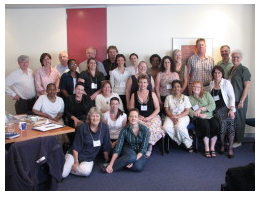
By 2006, as momentum gathered in Australia, Mike Green, of ABCD for Inclusion, undertook his first Australian tour which was hosted, in partnership, by Ted Smeaton, Benevolent Society and Dee Brooks, FAC, who are also International Faculty Members of the ABCD Institute. This series of workshops focused on ABCD in the disability sector and the initial training led to a series of workshops with the Department of Ageing, Disability and Home Care (ADHC), which was initially delivered by Ted Smeaton. This work ultimately led to influencing policy development as Ted supported ADHC to develop the now current Ability Links job description.
With the approaching National Disability Insurance Scheme (NDIS) roll out throughout Australia, Ted worked tirelessly with the sector, until his unfortunate passing in 2012. Dee Brooks has continued delivering this vital ongoing work. Vale Ted Smeaton.
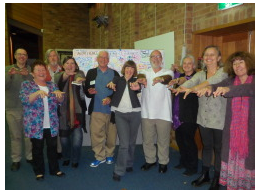
Mike Green revisited and teamed up with Dee Brooks and Michaela Kennedy of the Jeder Institute (who helped to blend Person Centred Practices with ABCD) and in 2013 the first Unconference, a participant-led gathering, was hosted based on strengths-focused practices and the underpinning principles of participatory leadership. The Unconference New South Wales is now in its’ 3rdyear with the Inaugural Victorian Unconference planned for later in the year plus 3 x 2 day events, in conjunction with ImagineBetter, across 3 locations in New Zealand in 2015.
On the advice of the Department of Ageing, Disability and Home Care (ADHC) and due to the ongoing rollout of the NDIS, until the present time, ABCD and Person Centred Practice has been an integral part of supporting services, organisations and individuals through the minefield of changes this has brought.

In 2007, a group of ABCD enthusiasts, from Australia and New Zealand, formed the ABCD Asia Pacific Network. The founding members, Judi Geggie, Dee Brooks, Jody Kretzmann, Peter Kenyon, Steve Hall, David Wilson, Ted Smeaton and Ric Thompson
continued to promote and deliver training and workshops throughout Australia, New Zealand and the Asia Pacific. By 2009, a membership website was established to offer support, share successes and help with challenges and evaluation. Judi Geggie, FAC, explains,
The ABCD Asia Pacific network became a vehicle, which provided a framework for the provision of training to practitioners in a focused and regulated way and to create a united voice to tackle bureaucracy.
In 2010, the 2nd ABCD Asia Pacific Conference hosted by the Family Action Centre, University of Newcastle was held and Cormac Russell, Nurture Development UK and Alison Mathie, Coady Institute, Canada joined a growing number of practitioners including Adrian Pyle, Uniting Church. Adrian remembers,
I first heard of ABCD in 2004 when I left the corporate sector to take on a grassroots community organizing role with the Uniting Church. The break from the corporate world meant I was searching for a break from deterministic, top down models of organizing. ABCD and I seemed destined to meet in that role and my heart leapt – or to put it another way my heart and my head connected around the ABCD way of thinking. ABCD offers a way that I can connect community organizing to the deepest, mystical understandings of the World’s great religions. It seems to be saying “This is the way life really works.”
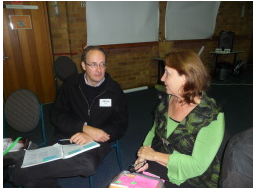
Adrian had started working for a little, local Uniting Church congregation with no academic background or professional experience of community development but a deep desire to help communities knit together. From the first moment he heard about the notion of ABCD it just seemed to “make sense.”
In reflection, Adrian said that some people saw it just as a tool to accentuate the positive, but he could see even at those early stages that it was more than just a tool – it was a change of mindset. The change of mindset wasn’t just about psychological positivity; it was about seeing communities holistically, which he also documents through his Gift-A-Blog, and as Adrian says,
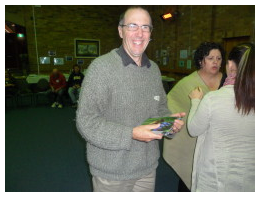 I am proud of how we have grown a small community in and around the Uniting Church who see this way of seeing the world as spiritually rich. We’ve been part of bigger ABCD programs, like the national 2009 Building Belonging initiative for thinking holistically about aged care and we’ve kicked off lots of smaller initiatives (such as a small group within a congregation “getting it” and setting out to help incubate this way of thinking in wider and wider groupings).
I am proud of how we have grown a small community in and around the Uniting Church who see this way of seeing the world as spiritually rich. We’ve been part of bigger ABCD programs, like the national 2009 Building Belonging initiative for thinking holistically about aged care and we’ve kicked off lots of smaller initiatives (such as a small group within a congregation “getting it” and setting out to help incubate this way of thinking in wider and wider groupings).
By 2012, larger contract work had commenced with government departments and medium to large organisations. Oneinteresting contract undertaken by the FAC was implementing ABCD practices, blended with Appreciative Inquiry and the Art of Hosting practices into the Defence Community Organisation, (DCO), Department of Defence, Australia, which saw Dee Brooks and Graeme Stuart deliver 2 day ABCD workshops on many military bases across Australia. ABCD also inspired Graeme to initiate community-led initiatives in both his work and home life, which he documents through his Sustaining Community blog and teaches through an Engaging Communities elective at the University of Newcastle.
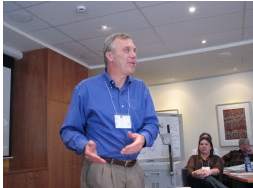 Since 2008 both Australia and New Zealand have benefited by regular visits by Jim Diers, head of Neighbourhoods Inc. With great enthusiasm Jim has facilitated workshops in many communities in Australia and New Zealand and these workshops have strengthened the appreciation of ABCD thinking in practitioners and policy makers. The Municipal Association of Victoria, in conjunction with the Bank of IDEAS, has been instrumental in opening up many of the opportunities for Jim to present to many audiences in the sector.
Since 2008 both Australia and New Zealand have benefited by regular visits by Jim Diers, head of Neighbourhoods Inc. With great enthusiasm Jim has facilitated workshops in many communities in Australia and New Zealand and these workshops have strengthened the appreciation of ABCD thinking in practitioners and policy makers. The Municipal Association of Victoria, in conjunction with the Bank of IDEAS, has been instrumental in opening up many of the opportunities for Jim to present to many audiences in the sector.
In 2012, inspired by Peter Kenyon and Dee Brooks’ work in the Newcastle and Illawarra regions, ABCD practitioner groups were intentionally coming together across the country in the form of both the ABCD Newcastle group and the ABCD Illawarra group who were looking for ways to support practitioners and community members and to explore how best to work together for the benefit of individuals and communities.
In 2013 a new stream of practitioner consciousness was also unfolding as strengths-focused practices were becoming more mainstream so, more Train the Trainer workshops were co-delivered by Dee Brooks, Jim Diers and Peter Kenyon and consultations with government departments such as the Australian Emergency Management Institute were co-designed. Large-scale community conversations were being hosted in a range of communities using ABCD and the Art of Hosting practices around conversations that matter, such as “What does inclusion mean to our community?” and Peter Kenyon, who is currently the Chair of ‘All We Need is Right Here‘ in Kalamunda, WA, commenced one of the biggest community asset mapping initiatives ever undertaken globally, involving 15 geographic communities and 120+ communities of interest.
In the year 2014, David Bowen, CEO of the newly established National Disability Insurance Scheme (NDIS) in opening the Queensland Disability Conference held high the Inclusion Works “Half Empty / Half Full” foam ABCD memento and opened his speech by saying “We have a lot to learn from this simple yet powerful message.”
Over the last 20 years, the ABCD Institute has provided clear language and simple analogies to explain what ABCD is about and as Peter Kenyon says,
We have to acknowledge there were a whole pile of people doing things early on to get it to where it is now and it needed clarification beyond the basics – it actually incorporates more now.
So, watch this space as the work of ABCD continues to strengthen communities and inspire people across the Asia Pacific region and beyond!
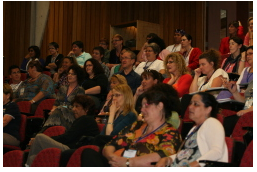
Below are the website links for the people who contributed and places mentioned throughout this historical reflection:
http://abcdasiapacific.ning.com
https://abcdillawarra.wordpress.com
http://www.allweneedisrighthere.org
http://www.communityeconomies.org/Home
http://www.imaginebetter.co.nz
http://www.inclusionworks.org.au
http://innovativeresources.org
http://www.lighthouseresources.com.au
http://www.matrixconsulting.net.au
https://www.newcastle.edu.au/research-and-innovation/centre/fac/abo…
http://www.nurturedevelopment.org
https://sustainingcommunity.wordpress.com






